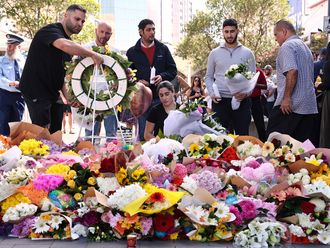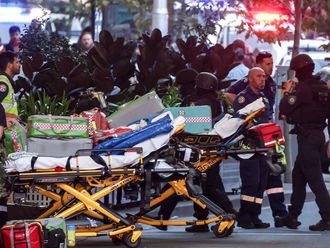Colombo: Britain’s David Cameron is set to become the first foreign leader to visit Sri Lanka’s war-torn Tamil heartland during next month’s Commonwealth summit when he will press Colombo on human rights.
The British premier is under pressure at home and abroad to boycott the summit over the bloody end to Sri Lanka’s ethnic conflict but he vowed in a meeting with Nobel laureate Aung San Suu Kyi to have some “very tough conversations” with President Mahinda Rajapakse’s government.
“My decision is the right thing for us to do... and have some very tough conversations with the Sri Lankan government,” Cameron said after hosting Myanmar opposition leader Suu Kyi in London on Wednesday.
“I’m not happy with their human rights record. I’m not happy with what they’ve done following the conflict and we’ll have some very frank conversations to make those points,” he said according to a transcript of his comments made available to AFP on Friday.
Suu Kyi appeared to endorse Cameron’s decision, but noted that he should engage “all other stake holders and not just the government”.
Added Cameron: “Very wise words. I’ll be going to the north of the country as well, and I think what Aung Sun Suu Kyi has said is absolutely true.”
If the visit goes ahead, Cameron would become the first foreign head of government to visit Jaffna, the capital of the war-battered north, since Sri Lanka was granted independence from Britain in 1948.
Colombo has faced widespread criticism over its failure to probe allegations that 40,000 Tamil civilians were killed by its troops in the last stages of the war in 2009.
Britain’s opposition Labour party has urged Cameron to boycott the summit while Canada has said the decision to allow Colombo to host the gathering was like “accommodating evil”.
A Tamil legislator from Jaffna, Suresh Premachandran, welcomed Cameron’s remarks and said his main opposition Tamil National Alliance was keen to host the British premier next month.
“I extended an open invitation to the British prime minister last week and I am happy that he has agreed to visit us and see for himself the plight of the Tamil people,” Premachandran said.
He said the unprecedented visit could send a strong message to the Sri Lankan government to clean up its act and demonstrate the international community’s solidarity with the island’s minority Tamils.
There was no immediate comment from the Sri Lankan government, but official sources said they noted a hardening of Cameron’s stance against Sri Lanka.
“He is obviously trying to placate his domestic opposition,” an official said declining to be named.
British High Commissioner (ambassador) in Colombo, John Rankin, made it clear last week that London’s concern was not limited to war crimes, but also rule of law and judicial independence in the former colony.
Rankin said they expected Sri Lanka to demonstrate its willingness to respect Commonwealth values as Colombo takes over as the Chairperson-in-office of the 53-member bloc after the Colombo summit.
Rankin said Sri Lanka must probe allegations by Britain’s Channel 4, which accused the country’s forces of executing surrendering Tamil rebels and shelling civilians in no-fire zones during the civil war.
He said Queen Elizabeth II was staying away from the Colombo meeting because she was unable to undertake long trips, but she would be represented by her son Prince Charles.












